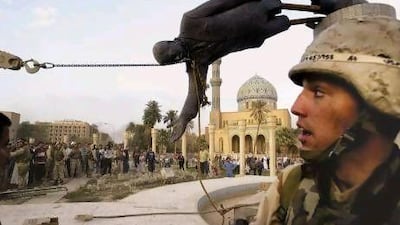Police are everywhere in Baghdad - in camouflage fatigues, heavily armed and backed with armoured vehicles. They man checkpoints that create gigantic traffic jams, several kilometres long at times, as they search cars and check identity papers.
The concrete barrier walls that have surrounded neighbourhoods since the height of sectarian violence in the last decade are still standing, a reminder of a dark chapter in Iraq's history. Power outages are frequent and long, leaving most households with 12 hours of electricity a day. Unemployment among young people is rampant, widely thought to be in double digits.
The worst may be behind Iraq - March registered the lowest number of violent deaths since the US-led invasion in 2003 - but the nation's future remains shrouded in uncertainty. Not just that, but there is evidence to suggest that the country could plunge again into sectarian violence or even break up along religious or ethnic lines.
Today marks nine years since the fall of Baghdad. The capital, the Iraq war's main battlefield, remains a city on edge.
Baghdad is dissected by checkpoints and walls and, more importantly, by a de facto sectarian segregation that has become entrenched. Neighbourhoods once considered a flashpoint in the sectarian violence that peaked in 2006 and 2007 remain walled off, with entry and exit points heavily guarded by police.
Sunnis and Shiites are reluctant to visit neighbourhoods dominated by the other sect, especially after dark or during holy days of the Shiite calendar when thousands are on the street practicing rituals.
Key facilities, such as hospitals, banks and government offices, are also walled off to protect against car bombs. Attacks blamed on Sunni militants have sharply declined, but they continue to take place, occasionally striking at the heart of the heavily protected Iraqi capital, killing dozens and wounding many more.
The Shiite-dominated government of Prime Minister Nouri Al Maliki showed just how fragile is Baghdad's relative peace when it hosted an Arab summit meeting on March 29. The already heavy security in Baghdad became greatly increased in the week ahead of the meeting, with tens of thousands of troops and policemen deployed across the city. With the city under lockdown, food prices, especially for fresh fruits and vegetables, rose dramatically, and moving from one side of the city to the other was virtually impossible. On the day of the summit, authorities disabled the mobile and internet networks.
Mr Al Maliki apologised to the Iraqi people for the "inconvenience" the summit caused them and a day later acknowledged that hosting the summit cost the treasury US$500 million (Dh1.84bn), a sum that left many Baghdadis angry and scratching their heads in astonishment as another unforgiving summer approaches with electricity still severely rationed.
Significantly, in today's Iraq, sectarian rhetoric, whether by Sunnis or Shiites, works like magic with followers of the two sects, whipping up resentment and hatred. It also feeds the prospect of division. Already, Sunni-dominated provinces have been clamouring for self-rule to escape what they see as the heavy-handed domination of the Shiite majority.
Provincial self rule is provided for in the constitution adopted in 2005, but Mr Al Maliki, a Shiite hardliner, has stymied the applications for self rule from at least three provinces, using a mix of bureaucratic hurdles, threats and divide-and-rule tactics.
The prime minister constantly boasts that he defeated terrorism, a word he uses to refer to the Sunni insurgency. He likes to take all the credit himself, never mentioning the role played by US forces over nearly eight years in Iraq, taking on Al Qaeda and supporting the nascent Iraqi forces as they learnt on the job.
Ironically, his policies might eventually lead to an outbreak of sectarian violence.
Mr Al Maliki, who rose from obscurity nearly six years ago to become prime minister, appears to tacitly approve blocking Sunni Arabs from top jobs in the security forces and academia, while nonetheless allowing Sunni and Kurdish cabinet ministers free rein in packing their ministries with members of their own group. Doing that has effectively created sectarian or ethnic spheres of influence within what is supposed to be a national unity government.
At the same time, he forced the top Sunni in the regime, the vice president Tareq Al Hashemi, to flee, accusing him of terror charges. The judiciary has a warrant out for his arrest. Mr Al Hashemi, a longtime critic of the prime minister, fled to the self-ruled Kurdish region to stay beyond the reach of Baghdad's jurisdiction. When he travelled to Qatar last week, the Baghdad government asked the Gulf Arab nation to hand him over. Qatar refused. Mr Al Hashemi then travelled to Saudi Arabia on Wednesday.
Another senior Sunni Arab, the deputy prime minister Saleh Al Mutlaq, has been banned from attending cabinet sessions because he called Mr Al Maliki a "dictator" in a television interview.
The Kurdish leader Massoud Barzani also accused Mr Al Maliki of monopolising power and preparing the ground for a return to dictatorship in an interview published yesterday in the pan-Arab Al Hayat newspaper.
An eagerly anticipated national dialogue to iron out differences between Iraq's rival groups - the Shiites, the Sunni Arabs and the Kurds - had been due to open in Baghdad on Thursday but was indefinitely postponed the day before. Parliament speaker Osama Al Nujaifi said holding it now would make matters worse.
foreign.desk@thenational.ae

